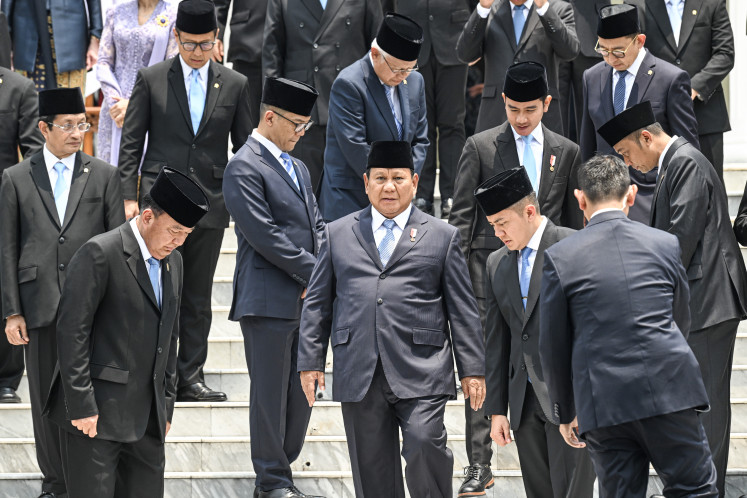Popular Reads
Top Results
Can't find what you're looking for?
View all search resultsPopular Reads
Top Results
Can't find what you're looking for?
View all search resultsKPPU probes into alleged cartel practices in soybean import
The Business Competition Supervisory Commission (KPPU) has started an investigation into possible oligopolies by major importers of soybeans in the country, following the commodity’s price increase
Change text size
Gift Premium Articles
to Anyone
T
he Business Competition Supervisory Commission (KPPU) has started an investigation into possible oligopolies by major importers of soybeans in the country, following the commodity’s price increase.
Oligopolies, which are prohibited under the 1999 Monopolies and Unlawful Business Practices Law, is cooperation among industry players to manage production or sales of goods and services which affects the market price.
KPPU chairman Tadjuddin Noer Said said on Monday in Jakarta that the investigation was being carried out as the soybean market was currently dominated by a few importers which controlled the market share and influenced market prices, as was seen in the unusual price increases in 2008. “We are finding similar conditions in our market now,” he told reporters in a press conference at his office.
Tadjuddin further said that the alleged monopoly might be conducted through managing volumes of imports to push up prices or by directly setting market prices.
In 2008, PT Gerbang Cahaya Utama and PT Cargill Indonesia together supplied 74.66 percent of total soybean in the country, while the rest was being controlled by Alam Agri Adiperkasa (10 percent), PT Cita Bhakti Mulia (4 percent) and others (11 percent). Gerbang held about 48 percent of the share while Cargill 27 percent in 2008, according to the KPPU.
That year, imported soybean from the United States reached US$600 per ton, while the selling price by importers was Rp 6,250 per kilogram (66 US cents).
The KPPU investigation in 2008 concluded that both firms did not hold a monopoly, as the fluctuation of soybean prices and volumes did not follow a regular pattern. The nation’s soybean import policy also did not hamper other players to enter the market.
Recently, the retail price of imported soybean has reached Rp 8,000 per kilogram, 60 percent higher than regular prices, which is usually around Rp 5,000 per kilogram. That compares to locally sourced soybean, which sells at about Rp 9,000 per kilogram.
The government has reiterated that the price increase is caused by the long drought in the US — the key source of Indonesian soybean imports.
KPPU spokesman Ahmad Junaidi said that his team would supervise the movement of prices in the domestic soybean market, particularly in the consumer bases of imported soybean, with 78 percent focused on five provinces — West Java, Central Java, Yogyakarta, East Java and Bali.
“We see the price increase as similar to the case in 2008 when the market structure was relatively
stable. We’ll try to find out whether the price increase is really influenced by weather, or something else,” he said. He could not say when the investigation was expected to conclude.
In response to the KPPU’s investigation, Rachmat Hidayat, the corporate affairs director of Cargill Indonesia, said that his firm never discussed issues pertaining to soybean sales, including prices and regions, with other parties.
Earlier, the firm said it had no plans to cut the volume of its soybean imports, even though drought has affected crops in the US. This year, the company aims to import between 240,000 and 250,000 tons of soybean, up from 220,000 tons last year.
Cargill currently holds around 10 percent share of the total imports nationwide, Rachmat said.
Gerbang Cahaya Utama could not be reached for comment on Monday.
Indonesia produced 851,286 tons of soybean locally last year, or only around 29 percent of its total consumption of 2.09 million tons, meaning the bulk was sourced from imports, according to the Central Statistics Agency (BPS).










